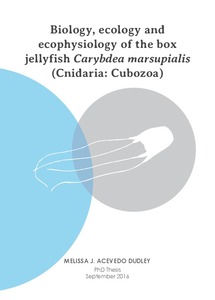Biology, ecology and ecophysiology of the box jellyfish Carybdea marsupialis (Cnidaria: Cubozoa) = Biologia, ecologia i ecofisiologia de la cubomedusa Carybdea marsupialis (Cnidaria: Cubozoa)

Visualitza/Obre
10.5821/dissertation-2117-105571
Inclou dades d'ús des de 2022
Cita com:
hdl:2117/105571
Càtedra / Departament / Institut
Universitat Politècnica de Catalunya. Departament d'Enginyeria Civil i Ambiental
Tipus de documentTesi
Data de defensa2016-10-24
EditorUniversitat Politècnica de Catalunya
Condicions d'accésAccés obert
Llevat que s'hi indiqui el contrari, els
continguts d'aquesta obra estan subjectes a la llicència de Creative Commons
:
Reconeixement-NoComercial-CompartirIgual 4.0 Internacional
Abstract
Over the last years, the sightings of the cubomedusa Carybdea marsupialis have increased in the Mediterranean Sea and this has been linked to an increase in its abundance. Consequently, this phD thesis addresses some questions regarding the possible causes and effects of this phenomenon. Firstly, the taxonomy and distribution of the species have been revised and updated. Moreover, laboratory experiments were conducted to study the development and ecophysiology of this animal. These results were complemented with field studies on the gut contents and trophic markers of C. marsupialis. Finally, the results of a four years monitoring in the coast of Denia (Spain), as well as the sightings of the species reported along the Mediterranean, provided solid evidence on the main factors affecting the distribution of C. marsupialis. Overall, the species seems to be favoured by high nutrient inputs from anthropogenic origin, and other human activities as coastal constructions. Los avistamientos de la cubomedusa Carybdea marsupialis han aumentado en el Mar Mediterráneo en los últimos años, hecho que ha sido atribuido a un incremento en su abundancia. El objetivo de esta tesis doctoral es responder algunas preguntas relacionadas con las posibles causas y efectos de este fenómeno. En primer lugar, se han actualizado la taxonomía y la distribución de la especie. Además, se han llevado a cabo experimentos relacionados con su desarrollo y ecofisiología. Estos resultados se han complementado con estudios de sus contenidos estomacales y marcadores tróficos en el campo. Finalmente, un monitoreo durante cuatro años en la costa de Denia (España), junto con los avistamientos de esta cubomedusa en el Mediterráneo, han proporcionado evidencias sólidas acerca de los factores principales que afectan la distribución de C. marsupialis. En general, la especie parece verse favorecida por el aporte de nutrientes de origen antropogénico, y por otras actividades humanas como las construcciones costeras.
Localització
CitacióAcevedo Dudley, M.J. Biology, ecology and ecophysiology of the box jellyfish Carybdea marsupialis (Cnidaria: Cubozoa) = Biologia, ecologia i ecofisiologia de la cubomedusa Carybdea marsupialis (Cnidaria: Cubozoa). Tesi doctoral, UPC, Departament d'Enginyeria Civil i Ambiental, 2016. DOI 10.5821/dissertation-2117-105571. Disponible a: <http://hdl.handle.net/2117/105571>
Col·leccions
| Fitxers | Descripció | Mida | Format | Visualitza |
|---|---|---|---|---|
| TMJAD1de1.pdf | 7,105Mb | Visualitza/Obre |


